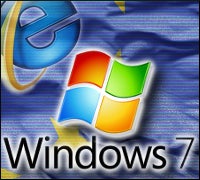 |
In a move aimed at heading off further punitive action by the European Commission (EC), Microsoft has confirmed that it will distribute Windows 7 without Internet Explorer within European Union (EU) countries.
The story came to light Wednesday when one of Microsoft’s (NASDAQ: MSFT) PC OEM partners leaked a confidential memo to that effect to Reuters, later confirmed by the software giant.
“We’re committed to making Windows 7 available in Europe at the same time it launches in the rest of the world, but we also must comply with European competition law as we launch Windows 7,” a Microsoft spokesperson said in an e-mail to InternetNews.com. “We have therefore decided that instead of including Internet Explorer in Windows 7 in Europe, we will offer it separately and on an easy-to-install basis to both computer manufacturers and users.”
A top Microsoft lawyer went further in a posting on the company’s On the Issues blog.
“This means that computer manufacturers and users will be free to install Internet Explorer on Windows 7, or not, as they prefer. Of course, they will also be free, as they are today, to install other Web browsers,” Dave Heiner, Microsoft’s deputy general counsel, said in his post.
European editions will have the suffix “E” appended to the product title — “Microsoft Windows 7 Home Premium E” — to distinguish them.
Selling Windows 7 without IE8 aims to remove any obstacles from Microsoft marketing Windows 7 in the EU, adding more certainty to the markets, to PC makers, and consumers.
The idea appears to be that now, no matter how the EC proceeds in its ongoing scrutiny of the company, Microsoft can have a compliant release of Windows 7 for sale in Europe at the same time the OS launches in the U.S. on Oct. 22.
The move is similar to the remedy that was prescribed by the EC in an earlier competition case regarding the bundling of Windows Media Player with Windows. Microsoft released editions of Windows in the EU that did not have the player. However, users evidently chose instead to buy PCs with the player installed. Both editions cost the same price.
This time around, unbundling IE may not do the trick for Microsoft’s pending case before the EC.
Microsoft has been under assault by the EC’s competition watchdog since January, when the agency informed Microsoft that its initial conclusions were that Microsoft has illegally bundled Internet Explorer with Windows since 1996, unfairly blocking competing browsers.
The company filed its response to the EC’s “Statement of Objections” in April. It had also requested an oral hearing in Brussels, but ultimately canceled that because key EC executives would have been out of town and the EC refused to reschedule it. That hearing was scheduled for last week.
[cob:Special_Report] The EC’s reaction to Microsoft’s announcement could only be characterized as lukewarm, although not altogether negative. A statement e-mailed to InternetNews.com by an EC spokesperson said the commission “notes with interest” Microsoft’s intent to ship Windows 7 without IE8.
However, the underlying message appears to be that Microsoft shouldn’t get its hopes up.
“In terms of potential remedies, if the Commission were to find that Microsoft had committed an abuse, the Commission has suggested that consumers should be offered a choice of browser not that Windows should be supplied without a browser at all,” Jonathan Todd, the EC’s spokesperson on competition, said in the e-mail.
The commission “would have to consider whether this proposal would in itself be sufficient to create genuine consumer choice on the Web browser market,” he added.
Awaiting a ruling
The developments come as the case against Microsoft is at a crucial juncture, with both Microsoft and the EU waiting for the EC’s competition directorate to make a ruling.
In just the past week, the EC has been circulating questionnaires to PC makers that ask whether Microsoft has pressured them to tell the EC that sanctions against Microsoft are not necessary. Additionally, the questionnaires also ask whether OEMs prefer having a list of browsers pre-installed on each PC so that users make a choice at initial start-up, or whether they would prefer the start-up screen only include links to major browsers’ download sites.
Some analysts say that forcing PC OEMs and Microsoft to provide the option to install any of the leading browsers at start-up will be an unnecessary added expense and a support nightmare. Still, Microsoft warned shareholders in January that it is likely to have to bundle third-party browsers with Windows in the EU.
In early March, Microsoft confirmed that beta builds of Windows 7 have a feature that enables them to disable and visually remove IE from the system.
“Obviously, this is a big step for Microsoft. But we’re committed to launching Windows 7 on time in Europe, so we need to address the legal realities in Europe, including the risk of large fines. We believe that this new approach, while not our first choice, is the best path forward given the ongoing legal case in Europe,” Heiner wrote in his post.
Update adds comment from Todd.


